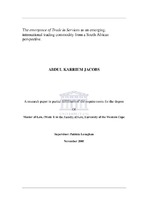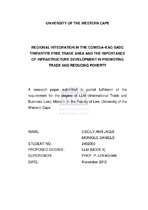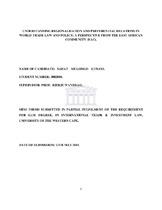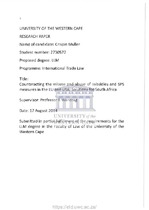The emergence of trade in services as an emerging, international trading commodity from a South African perspective
| dc.contributor.advisor | Lenaghan, Patricia | |
| dc.contributor.author | Jacobs, Abdul Karriem | |
| dc.contributor.other | ||
| dc.contributor.other | Faculty of Law | |
| dc.date.accessioned | 2013-07-17T10:11:44Z | |
| dc.date.available | 2007/04/20 08:15 | |
| dc.date.available | 2007/04/20 | |
| dc.date.available | 2013-07-17T10:11:44Z | |
| dc.date.issued | 2005 | |
| dc.identifier.uri | http://hdl.handle.net/11394/1659 | |
| dc.description | Magister Legum - LLM | en_US |
| dc.description.abstract | The reason for highlighting the difference between GATT and GATS is to focus on the impact of these agreements on the developing countries and in particular the latter will be the main focus of this paper. The economies and governments of the developing states are struggling to generate sustainable capitol growth and maintain financial stability to enhance economic growth. This is due to dictators who rule in such a manner to maintain power irrespective of the future economic viability of their state. Thus the environment for sustainable economic growth is wrath with political instability, lack of proper financial control and eagerness to attract foreign investment and allowing market access to developed states. | en_US |
| dc.language.iso | en | en_US |
| dc.publisher | University of the Western Cape | en_US |
| dc.subject | General Agreement on Trade in Services (1994) | en_US |
| dc.subject | International trade | en_US |
| dc.subject | Foreign trade regulation | en_US |
| dc.title | The emergence of trade in services as an emerging, international trading commodity from a South African perspective | en_US |
| dc.type | Thesis | en_US |
| dc.rights.holder | University of the Western Cape | en_US |
| dc.description.country | South Africa |




